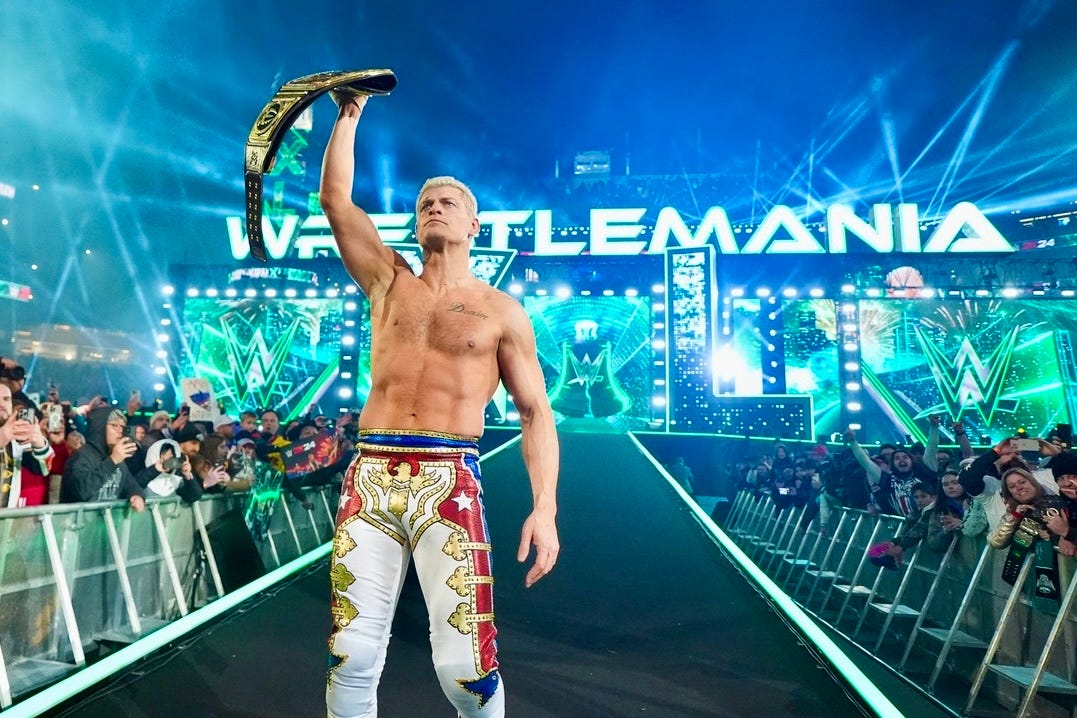Paved with gold
London wrestles, anti-doping on the cheap and risk-free returns
It’s mayoral election day, but London is hardly gripped by voting fever. I’m no psephologist, but it seems a safe bet that turnout will slide under 2021’s 42%, perhaps beneath the historic low of 34% recorded in 2000’s inaugural poll. So many candidates - thirteen - but it feels so little choice. The political battle has been shaped by transport and policing, the principal responsibilities of an otherwise limited role, but sport has made one appearance to intrigue this particular voter.
A week out from polling day, incumbent Sadiq Khan declared his ambition to bring a string of major sporting events to London, especially from America, building on the current programme of NFL and Major League Baseball matches. Bizarrely, his desire to host WrestleMania made the local headlines, although a pitch for the Super Bowl and the 2040 Olympics ensured broader media reach.
Khan has said he’ll set up a task force to pursue these targets if re-elected. He’ll forgive me, I hope, if I roll my eyes at this tried but not trusted approach to getting things done. I’m all for hunting down more events to hold in London, though. Not that the capital needs any of them individually, but a hefty portfolio does give the city a credible claim to be in a global premier league of sports hosts. And I’d much rather jump on a tube to watch the world’s best athletes than fly halfway round the world to do so.
London doesn’t need any specific event because it is rammed with visitors almost all of the time. Tourists arriving to watch sport simply fill hotel rooms that would otherwise be used by people with different leisure or business agendas. Consultants calculate and trumpet the positive economic impact of big events, but regular readers will know my deep scepticism about the methodology behind such studies.
Taken as a whole, however, a sporting reputation built on a roster of events can become an important dimension of a city’s reputation, ranking alongside its arts, museums, heritage, architecture and cuisine. Drone shots of sporting venues interspersed with footage of iconic landmarks get viewed worldwide, subliminally advertising a city’s wares to potential future visitors.
I am chair of the World Team Table Tennis Championships London 2026, which are backed by the mayor and his team at City Hall. I’m conscious of the piece this will represent in the jigsaw of London’s international sporting reputation. I’m as enthused, however, by the opportunity this gives youngsters in London and beyond to engage directly with elite athletes in a sport that is simple to understand and many will have had the chance to play. Far better here then, speaking as a Londoner, than the Championships being anywhere else in the world.
A report in The Standard of Sadiq Khan’s plans included a dampener from his own Labour Party’s post-holder for sport, indicating there were no additional funds available for him:
“Do you know, wouldn’t it be marvellous to be able to promise the moon? I would love to be able to.” Thangam Debbonaire, Labour Shadow Culture and Sport Secretary
In the same week, Barry Hearn gave a typically blunt response to those alarmed at the possibility of snooker’s World Championships moving from their traditional home of The Crucible in Sheffield to Saudi Arabia:
“Trust me, money has the edge every time… There’s never enough. It’s all about money. Get used to it.” Barry Hearn
Western cities and governments are increasingly finding their pockets too shallow to compete with the likes of Saudi, Qatar and China in the competition to host sports. Truly global brands are pretty ambivalent as to the location of the major events they plaster their logo on, just so long as they garner eyeballs from around the globe. International governing bodies are keen to grow supporter bases in newer territories rather than established markets.
All of which challenges London to work harder to sell its attractions. Reputation is critical - for slick organisation, full venues and a fun time had by all concerned, including the athletes but especially the VVIPs who make the decisions on future host cities and countries. It helps that for American sports, including wrestling (if we can call WWE a sport), Britain is still deemed a newish market with scope to grow a fanbase.
Anyone else remember Dickie Davies and World of Sport on Saturday afternoons? Smile when you check out WrestleMania here
With cash in short supply, there is an imperative to find commercial partners prepared to underwrite events, so alleviating the burden on the public purse. No doubt City Hall will be examining the new joint venture between UK Athletics and the organisers of the London Marathon and the Great North Run. The two event companies are stepping in to underwrite the European Athletics Championships in Birmingham in 2026, the city having spectacularly run out of cash. A new model that will also be scrutinised carefully by many other sports and cities in Britain keen to compete on the world stage.
Unlikely I’ll get a task force call-up after my comments above, but here’s one piece of advice from me: investing to cultivate a calendar of repeat events has far greater benefit over time than splurging on a mega jamboree such as the Olympics or the Super Bowl. That’s not simply in immediate financial or economic return (if there is any) but in the sporting habits of a city’s population and the richness of experiences it offers visitors. Happy to provide a list of suggested targets on request…
Synchronised swimming
Thomas Bach has given WADA the IOC’s backing in the row about the 23 Chinese swimmers that the anti-doping agency and World Aquatics allowed to compete in Tokyo after they tested positive for the same banned substance, trimetazidine.
“Full confidence” was the phrase Bach used. You’d hope so. After all, the Olympic movement funds 47.7% of WADA’s budget; this matched by 189 governments worldwide with the balancing 4.6% footed by the city of Montreal which houses the agency.
That budget, at $52.4 million, is too small for the organisation central to the fight against doping, and its relationship with the IOC is too close. But unless governments and non-Olympic sports step up, expect raised eyebrows to continue to be the order of the day when situations like this occur - whatever their rights and wrongs.
“To leap to conspiracy theories of cover-ups and favouritism towards China is outrageous, without basis and defamatory.” Read WADA’s defence - including a dig at arch-critic Travis Tygart of USADA - here
Risk-free returns
Back to last week’s Sport inc. comments about The Hundred and my suggestion that the eight hosts of the competition’s franchises have been claiming this is a risky business for them. The ECB has since increased the stake it is selling for the benefit of all eighteen counties plus the MCC. We will know in about a fortnight whether this concession has done the trick and enabled a deal between all parties so that an auction process can then begin.
As to the claim about risk, we shouldn’t forget that each of the eight hosts could decide to sell up entirely at the outset, so banking tens of millions of pounds for taking no risk whatsoever. They could then simply let a third party run the cricket on their ground every August for The Hundred and invest their windfall on physical infrastructure or human capital.
Little wonder the have-not counties are angsty. If it was down to me, I’d insist hosts retain their stake for a minimum period - say, 3 years. Otherwise, if they want to get off risk earlier, all sale proceeds would be spread equally across the counties.



